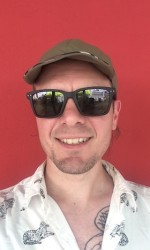David L. Boren Graduate Fellowships, an initiative of the National Security Education Program, provide funding for U.S. graduate students to study less commonly taught languages in world regions critical to U.S. interests and regions that are underrepresented in study abroad programs. This year, two graduate students — both master’s students in the Jackson School — have been awarded the Boren Fellowship to improve their language skills and enhance their research efforts. Benjamin Kantner, master’s student in International Studies, is studying in Brazil, and Pablo Tutillo, master’s student in Middle East Studies, in Israel. We spoke with Benjamin Kantner about their research, career goals and plans for the Fellowship.
Benjamin Kantner, master’s in International Studies, Jackson School

What do you study, broadly?
Political Ecology in Brazil with a strong influence from environmental anthropology. My primary geographic focus is the state of Pará in the Brazilian Amazon. My master’s thesis studies the relationship between indigenous rights and international conservation in the Tapajós Basin. My Boren Fellowship will consider the contributions to land security provided by including traditional and indigenous Brazilians in decision-making involving infrastructure projects.
Why did you decide to pursue the Boren Fellowship?
I have had two study abroad experiences in Brazil, each for a period of two months. My fluency in Portuguese and sense of place grew tremendously, amplified with the increase of time. The Boren Fellowship offered an opportunity for extended fieldwork in Brazil, and a chance to grow more familiar with the environment: cultural and ecological. I have also always had an interest in government service which is a component of the Fellowship.
What do you hope to take from the Boren Fellowship?
My primary goal is for the research I conduct to contribute to the communities in Brazil fighting for recognition in their struggle against extractive industries in the Amazon. I’m also very excited about the potential for further study exchanges and cooperation between the University of Washington and the Federal University of Pará in Belém, Brazil. This fellowship represents an important moment in my academic development as it supports the continuation of my thesis research which I began in Brazil in the summer of 2017 with a Foreign Language and Area Studies Fellowship. It may also contribute to a Ph.D. in the future.
What’s next for you after the Boren?
After returning from Brazil, I will defend my master’s thesis. I plan to apply to environmental anthropology-geared Ph.D. programs on the West Coast. One of the conditions of the Boren Fellowship is a year of working for the federal government. I would like to defer this until after I complete a Ph.D. in order to be more competitive for an inspiring position at the U.S. State Department.
What are you most looking forward to in Brazil?
In Brazil I’ll be working closely with Professor Rodrigo Peixoto at the Federal University of Pará. In the past, he led a task force at the Jackson School with Professor Jonathan Warren. I’m very excited to continue building on this exchange of research and learn from Professor Peixoto. To be honest, I’m also looking forward to avoiding my first Seattle winter in a decade. The Amazon Basin is an incredible part of the world, often even feeling separate. To become fully immersed in that environment is a rare opportunity for outsiders and is essential for producing relevant research. Finally, I’m deeply involved in music in Seattle and am thrilled to jump into a unique sonic ecosystem; Brazil is passionate about music and Pará is no exception.
Published October 2018, Updated November 2018